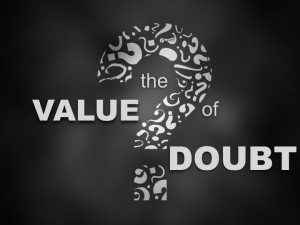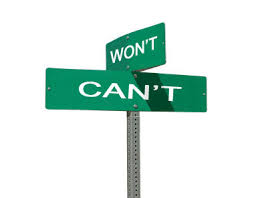In our culture, “doubt” is normally considered a detriment. From the early days of our education, we are praised for knowing the answer and made to feel less than adequate if we don’t.
But I’m here to sing the praises of doubt. Doubt’s a good thing. If I doubt, it means I’m not sure. And too much certainty can be crippling.
Clearly there are situations in which we behave and react better when we know what to do. When I stop at a stop sign while driving, it saves me from potential danger. If I have doubts about what to do in that context, then I’m exposed to all sorts of grizzly outcomes. There are times and places where knowing can literally be a lifesaver.
But when it comes to human interactions, I believe there is plenty of room for doubt.
If you and I have opposing views on some subject (anything from how toilet paper rolls off the roll to who’s in the right in Ferguson, Missouri), how our conversation goes will depend on how strongly we want to defend our “knowledge.” I’ve made the point before that when a Knower/Judger argues with a K/J, unless one or the other backs down at some point in the inevitable escalation, somebody will end up dead. Yes, dead.
Think about it. Two people with opposite views believe in their heart of hearts that they are right. They know. The less critical the subject, the more likely it is that one or the other of the combatants will concede or at least walk away. It’s a matter of which combatant’s personal well-being is threatened more by losing the debate. If both combatants value their opinion to the max…somebody’s going to die.
When is an opinion ever that important? You’d be surprised. Or maybe you wouldn’t. Who hasn’t heard the office fight over an unfinished report? Or the baseball dad who clearly saw the tag at home plate? There are all kinds of YouTube videos of dads physically attacking Little League umpires for the calls they’ve made. Now that’s important stuff. Well, you’d think it was, by the ferocity with which two people go at each other, wouldn’t you?
One of the tools for calming the world and maintaining civility and presence is to give the other party the “benefit of the doubt.” Maybe, just maybe, I don’t have all the data. Maybe my conclusion is inaccurate. Blasphemy! Or is it?
My own resistance to doubt all stems from Mrs. Meissner, my fourth-grade teacher. She made me feel awful when my answer wasn’t right. Getting it right was a rule. Not knowing was bad. Doubt was to be avoided.
So here I am almost 60 years later developing ever-increasing clarity with age, and it hits me. I never really have all of the data on any topic about which I deduce judgments. But I think I know, and so feel totally comfortable that I have no doubt.
While Mrs. Meissner would be proud of me, my experience has shown that being confident in my positions, with absolutely no doubt, causes me no end of challenges with bosses, direct reports, spouses, parents, and children.
So how can I reap “the benefit of the doubt”? I see two positive scenarios:
A. I perceive that I don’t have all the data and that it’s absolutely possible I am not right. Swallowing my ego (tempering my K/J) and developing and exploring my own personal doubt (invoking my Learner/Researcher) increases the likelihood that I will learn something.
B. I perceive that I have all the data, education, intelligence, and supporting logic and that I am right. If in my discussion with you, I were to give you my best Mrs. Meissner presentation—confident, bold, and enthusiastic (from my K/J)—I think it’s likely you would either respond with a challenge (in which case our K/Js are now engaged in battle) or recognize the stupidity of your position and feel put down. But on the other hand, if I were to revert to “A.” above and express some level of doubt in my certainty, you aren’t likely to have to defend your position (because I’m asking you to explain it), nor will I be perceived as putting you down. Now the conversation can continue civilly, and if I am indeed right, we both have the highest possibility of seeing it. And (heaven forbid) I could discover I was in error. Either way, by exploring the doubt, a better conversation can take place, likely yielding a better outcome.
I’m a growing fan of doubt. I would go so far as to suggest that we really connect only when all parties concede that we have doubt. It’s a risky position. Doubters are vulnerable to K/J attacks. The rewards, however, are tremendous.
We arrive at consensus as opposed to agreement.
We collaborate in discussion rather than debate.
We teach and learn rather than tell and defend.
Definite benefits of the doubt.




Kim, I highly respect your rational argument about the value of doubt. However, when generations of a race of people have been punished and/or killed because of the color of their skin, a highly emotional reaction can be understood and expected.
My good friend, Shirley, an African American who lives in Evansville, Indiana, related the following story to me a few months ago: Last summer, her grandson got off work one night, probably around 11:00. His car which he shares with a friend needed work in order for it to be driven to work the next morning by his friend.
As they worked with lighting in the driveway of his home, two police officers stopped and accused the two men of stealing the car. The only thing which saved the two men from possible beatings and arrests was the grandson’s girlfriend who is Caucasian, coming to the front porch and remaining there, even though the officers kept telling her to go inside.